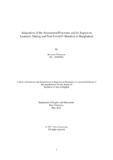| dc.contributor.advisor | Al Amin, Md. | |
| dc.contributor.author | Tabassum, Rezuana | |
| dc.date.accessioned | 2023-06-26T08:44:56Z | |
| dc.date.available | 2023-06-26T08:44:56Z | |
| dc.date.copyright | 2022 | |
| dc.date.issued | 2022-05 | |
| dc.identifier.other | ID 18103032 | |
| dc.identifier.uri | http://hdl.handle.net/10361/18661 | |
| dc.description | This thesis is submitted in partial fulfillment of the requirements for the degree of Bachelor of Arts in English, 2022. | en_US |
| dc.description | Cataloged from PDF version of thesis. | |
| dc.description | Includes bibliographical references (pages 38-43). | |
| dc.description.abstract | In our country, the long-established face-to-face assessment process shifted to an online mode due to the pandemic. However, teachers and the authority could not apply that established method during the remote assessment. To assess students’ knowledge, they started to take assignments that were assigned by the teachers. Besides assignments, teachers used continuous assessment procedures to assess learners’ knowledge. The assessment process changed again when the pandemic’s intensity started to cool off and everything was gradually returning to its place. Therefore, this study focuses on the two aspects of English assessment at the junior secondary level of Bangladesh; one is the adaptation of the assessment process of English throughout the pandemic as well as in the time of post-pandemic transition and another aspect is the impact it had on students and teachers during the same period. This study is accomplished by following a qualitative research approach. All data has been collected by interviewing participants and analysed through thematic analysis. The participants are teachers and students of junior secondary level in Bangladesh. The results are reported under the following themes; i) Adaptation of Assessment Process ii) Different types of Assessments and iii) Impact of the assessment. Moreover, this study offers a brief discussion on these themes, for instance, it talks about how teachers and learners have adapted to all new assessment processes during the pandemic and in the transition to post-pandemic. Then it focuses on the types of assessments English teachers have followed in online mode as well as after the pandemic. Lastly, this study explains the impact alternative assessments had during the pandemic and are now in the post-pandemic transition period. It also examines both the positive and negative impacts of the assessment methods applied by our institutions. | en_US |
| dc.description.statementofresponsibility | Rezuana Tabassum | |
| dc.format.extent | 45 pages | |
| dc.language.iso | en | en_US |
| dc.publisher | Brac University | en_US |
| dc.rights | Brac University theses are protected by copyright. They may be viewed from this source for any purpose, but reproduction or distribution in any format is prohibited without written permission. | |
| dc.subject | Pandemic | en_US |
| dc.subject | Junior secondary level | en_US |
| dc.subject | Online-assessment | en_US |
| dc.subject | Post-pandemic-assessment | en_US |
| dc.subject.lcsh | Coronavirus infections | |
| dc.title | Adaptation of the assessment processes and its impact on learners: during and post-Covid19 situation in Bangladesh | en_US |
| dc.type | Thesis | en_US |
| dc.contributor.department | Department of English and Humanities, Brac University | |
| dc.description.degree | B.A. in English | |

